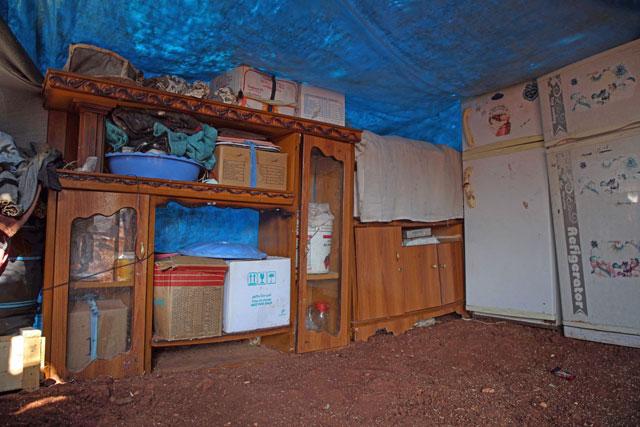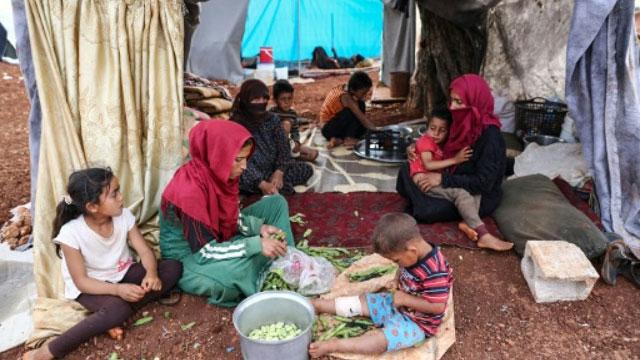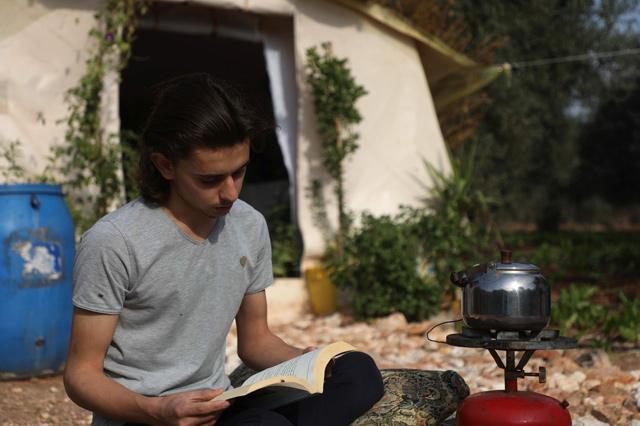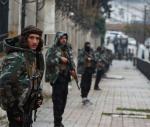You are here
Syrians destitute under olive trees after days of bombing
By AFP - May 08,2019 - Last updated at May 08,2019
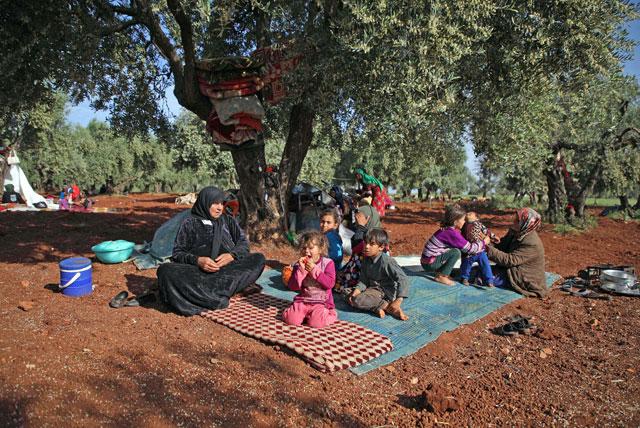
Displaced Syrians sit in a field near a camp for displaced people in the village of Atme, in the northern Idlib province, on Wednesday (AFP photo)
ATME, Syria — For nine days, Syrian matriarch Fatima Al Masri has slept under olive trees near the Turkish border, after fleeing air strikes by the regime and its allies on her hometown.
“We ran from the bombardment and the barrel bombs,” said the 66-year-old, sitting cross-legged on a woven plastic mat surrounded by her grandchildren, just hundreds of metres from the frontier.
“The planes were firing down so nothing would remain alive -- not a tree, person or sheep,” she told AFP, wearing a long purple faux velvet robe and a black scarf tied around her wrinkled face.
Her family is one of dozens to have set up camp in the fields of Atme, after escaping devastating bombing by the regime and its Russian ally in recent days on the extremist-held region of Idlib in north-western Syria.
A September ceasefire deal between Russia and rebel backer Turkey was supposed to prevent a mass regime offensive on the region of some 3 million people.
But the terrorists of Hayat Tahrir Al Sham, dominated by members of a former Al Qaeda affiliate, taking over the area in January has led to a spike in deadly air strikes and shelling.
The United Nations says more than 150,000 people have fled their homes in just a week, escaping strikes and shelling that the Syrian Observatory for Human Rights says has killed 84 civilians in the region.
In the olive grove in Atme, Masri and dozens of other families have spent the night on thin mattresses or blankets layed out over rugs on the red earth.
At the base of the trees they have chosen for shelter, they have stored the bare minimum for a life outdoors: bedding, a water cooler, a saucepan, or a cooking gas canister.
They have hung up sheets between the trees for a little privacy, and one family has even brought a solar panel.
‘No aid, nothing’
The families say most camps for the displaced in the area were full when they arrived, and the only one with enough space enforced gender segregation.
Choosing to keep their families together, they set up camp between the olive trees instead.
But Masri said they desperately need better shelter.
“We’re 35 families here. People want tents,” said the matriarch from the town of Kafr Nabouda, an area in the north of Hama province that was overrun by regime forces on Wednesday, according to the Britain-based Observatory.
Nearby, Issam Derwish said he fled with his family to the Turkish border from the same town, hoping for safety but also help from aid organisations in the area.
“We gathered our children and fled, coming here to Atme” four days ago, said the 35-year-old with a short black beard, dressed in a long brown tunic and trousers.
But “there’s no aid, nothing”, said Derwish, who who arrived at the frontier with his two wives, mother, sister-in-law and children.
“We’re just sitting here under the trees in the rain and cold.”
Syria’s war has killed more than 370,000 people and displaced millions from their homes since it started with the brutal repression of anti-government protests in 2011.
Between the silvery green trees in Atme, some families appear to have received boxes of food on Tuesday night to break their fast after the holy Islamic month of Ramadan started on Monday.
But until more help arrives, Jamila Khalof, 50, said she and her family are having to rely on themselves.
“We have nothing,” said the woman from Maaret Hermeh village, in the southern Idlib countryside, a floral scarf knotted under her chin.
“My children have gone back to get our things under the bombing. They’ll get them and come back,” she said.
Related Articles
ATME, Syria — For years, Abu Ali sold used furniture and home appliances for a living.
ATME, Syria — Outside her makeshift tent, Syrian mother Mona Mutayr lays out a frugal meal of potatoes and cucumber as her family marks thei
ATME, Syria — Among the olive trees in northwestern Syria, displaced teenager Wissam Diab plucks an oud outside his new home, a tent surroun


